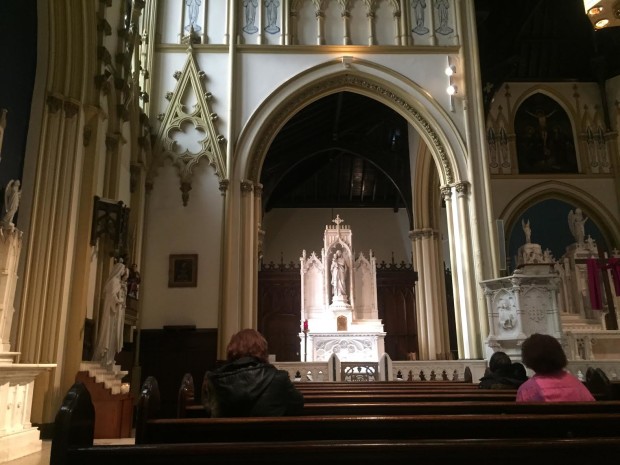By Marissa Wenzke
Inside the gothic arches of the Church of the Holy Name of Jesus, a Roman Catholic parish on the Upper West Side, a priest stands before the cream-colored marble altar, engraved with an image of the Last Supper. He stretches his arms out, palms facing up.
“The Lord be with you,” he calls out to the dozen or so people before him, standing in a sea of mostly empty pews.
 “And with your spirit,” the parishioners recite back.
“And with your spirit,” the parishioners recite back.
Then, he gives another blessing before speaking the last words of the day’s mass.
“Go forth, the mass has ended.”
But one person not yet leaving the church at 207 W. 96th St. is Stephanie Frias, a 26-year-old Bronx native. As the other church-goers trickle out of Saturday morning mass, into the brisk late January air, Frias sits back down. She picks up her iPhone, and leans over, smiling and whispering that she’s going to re-read the day’s gospel on her phone.
She folds her hands, looks straight ahead, and sits in silence. After picking up her phone for a minute or two, she places it back down. Then, after about 15 minutes of prayer, Frias stands up and walks out of the church.
It’s a simple but distinct act that marks her apart from the other parishioners at today’s mass.
Frias is a member of the Roman Catholic prelature of Opus Dei, a conservative branch of the Church with about 3,000 members across the U.S., according to its website.
Members must attend mass everyday, and after each ceremony, they are expected to stay and pray longer.
“At that moment, you’re reminded of what Jesus did,” Frias said, describing this time as a tribute to the sacrifice Catholics believe Jesus made by dying the cross.
For members of Opus Dei, just as for all Catholics, Jesus Christ dying on the cross was the ultimate sacrifice. That’s why it is important for believers to offer personal sacrifices or give thanks, as explained across Catholic literature and bible readings.
“The idea of sacrifice is very much a part of the Catholic spiritual condition,” said Brian Finnerty, the U.S. spokesperson for Opus Dei, citing the practice of giving up something for Lent, the 40 days before Easter.
Sacrifice and giving thanks are, indeed, at the center of what Frias feels in her after-mass prayer.
“It’s just to appreciate everything that happens to you,” she said, nodding, her brows raised in affirmation. “You can go on with your day and feel good because you had that moment of gratitude.”
This moment of prayer goes back to the roots of Opus Dei. The Spanish Catholic priest who founded the organization during the late 1920s, St. Josemaria Escriva, would spend 10 minutes after mass each day in prayer.
But the ritual is not just a symbol of gratitude. More specifically, it’s a recognition of the communion received during mass, which Finnerty said Catholics see as “the closest we’ll ever get to Heaven while we’re here on earth.”
“You have received your Lord, the creator of the universe,” he said of the moments after communion. “There’re angels trembling at the sight of what there is right inside of you.”
With communion inside one’s body, it would not be right or holy to rush out of mass, Finnerty said. So the prayer Opus Dei members have after mass is also an act of respect, of love and of awe for the Body of Christ inside their bodies.
In a collection of homilies titled “Christ is Passing By,” Escriva wrote that this is why a personal moment of prayer is needed.
“If we love Christ, who offers Himself for us, we will feel compelled to find a few minutes after mass for an intimate personal thanksgiving, which will prolong in the silence of our hearts that other thanksgiving which is the Eucharist,” Escriva wrote.
Still, the small act, for Frias, “is all about gratitude.” While agreeing that communion is the closest believers can come to God, she does not mention the act of communion as particularly relevant to the after-mass prayer.
She mostly sees it as an extra act of holiness, just like Opus Dei practices such as overnight prayer retreats, where men and women are separated, or the more controversial, less common practice of mortification of the flesh, most commonly done by wearing a metal clamp called a cilice around the thigh.
These practices are an extra show of sacrifice and commitment to God, Frias said, as they allow Catholics to come closer to God without entering the seclusion of a convent or priesthood.
“With Opus Dei, you’re supposed to be a part of the world,” she said. “You don’t have to remove yourself from the world.”